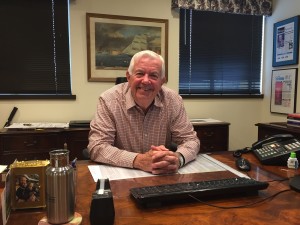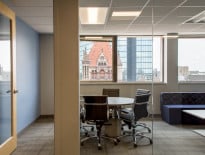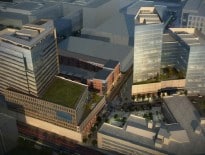William Cummings
Founder, Cummings Properties
Age: 79
Experience: 50 years
Bill Cummings hasn’t always taken the conventional approach in real estate, but it’s hard to argue with the results. The Medford native and Tufts University graduate built a 10-million-square-foot commercial property empire in 10 northern suburbs, but never expanded into Boston or Cambridge. Rather than outsourcing to specialists, Woburn-based Cummings Properties handles design, development and management duties in-house. More than half of its 370 full-time employees are tradespeople. It has over a dozen attorneys on its payroll in various capacities, but just a few MBAs.
In 1986, Cummings transferred most of the portfolio to a charitable trust. The $1.2 billion Cummings Foundation annually awards $100,000 apiece to 100 local nonprofits. In 2015, it announced its support for a 100,000-square-foot new academic building at Tufts to be built on land owned by the university and air rights above the College Avenue station on the MBTA’s Green Line Extension.
Q: You had a 50-year anniversary of your first real estate acquisition in September. Real estate was a second career?
A: I enjoy it just as much as when I didn’t know a thing. In those days, I didn’t know anything about construction. I had a business in Medford that I’d acquired a few years earlier on Fulton Street. I manufactured Old Medford juice drinks. I paid almost nothing for that business in 1963. It started to grow and be very successful. The company had 25 accounts, but two of them happened to be the Walker Memorial Dining Hall at MIT and the other was at Harvard Law School. They used Old Medford punch for a seminar or get-together. The approach that I used was, “You can serve them Old Medford and it costs 2 cents per serving, or milk at 5 cents per serving.” And it worked. So we got a few hospital accounts and I met my wife Joyce at Massachusetts Eye and Ear Infirmary on a business call. So that was the good thing about the hospital business. We just had our 50th wedding anniversary. I sold the company in 1970.
Q: But not the real estate?
A: We moved the company up to Henshaw Street in Woburn, bought the building, enlarged it and there was extra land, and built more space and rented it out. I decided that was kind of fun. We bought land on the other side and put two buildings on it. Both of them leased up very well and decided we ought to think about a different career. I sold Old Medford and used the proceeds to build the first buildings. I’m kind of a frugal guy and was able to start building across the street from here (on Washington Street) in Woburn. It was a 20-acre parcel.
Q: You’ve developed properties in 10 communities, all in the northern suburbs. Did you ever look at Boston real estate?
A: I was scared to death of it. I didn’t think I knew enough to get involved with downtown properties. I was also apprehensive about getting involved with the city and not knowing the politics. I’m kind of laid-back about a lot of things and I’m not a big schmoozer. I wanted to go where my comfort zone was, up in the suburbs. It’s as simple as that.
Q: What was the first property that you converted into life science space?
A:It was part of the middle building at Cummings Park across the street here in 1985. We’ve got a couple million square feet of laboratory and pharmaceutical and medical space. That includes a lot of physicians’ offices in Beverly. We get a good bit of Cambridge (life science) spillover, more so than ever before because the pressure’s on there.
Q: What made you decide to do your first residential development in decades, the Elliott Landing condos in Beverly?
A: No good reason why we didn’t do more before. Literally it was 30 years ago that we built 147 units at Place Lane here in Woburn. It was just before the real estate bust at that time. We sold out the first 110 of them and then, nothing. Absolutely nothing, so we rented apartments for a while. That happens sometimes in real estate. Boom, it’s gone. You ask why we didn’t do more: we were busy building other things. And it’s a lot less unnerving to build commercial than residential space, dealing with the intricacies of every apartment.
Q: You originally considered a hotel there, right?
A: You’ve done your homework. We tried in the darndest way. We thought a hotel would be perfect. The group that assesses the hotel industry didn’t buy into it. They said, “That’s not a good site for a hotel.” So we said, “OK, it’s time for a change.”
Q: Any changes in the way the Cummings Foundation disperses its funding?
A: We were all local, with the three counties where we have our properties and where our people and clients live (Essex, Middlesex and Suffolk). We felt we could make a meaningful difference if we keep it local. But we also did the funding for a new university in Rwanda, teaching European and North American medicine in a way it can be practiced in other parts of the world. The first phase is fully funded. We gave $15 million on the condition they raise another $15 million and they did. The first phase will open in September 2018. They expect to have 1,100 students when the first phase is completed.
Q: Is Cummings looking for additional acquisitions?
A: We acquired Dunham Ridge in Beverly next to the North Shore Music Theatre (in 2011). We purchased 55 acres in a distressed sale. We see 10 buildings going in there. It’s a neat, fun feeling to be there, and we’re thinking about a hotel out front that you can see from (Route 128) beautifully. There will be an 8-acre site which is going to be a flat pad and boom, here’s the highway right in front of you. It’s a fantastic site. We have a purchase-and-sale for a 125-unit assisted-living community in there which is currently going through permitting in Beverly.
Five Other Businesses That Cummings Founded:
- Ice cream novelty sales from the back of his bicycle at Ford Motors’ auto assembly plant in Somerville during middle school.
- Boat buying (from Boston Globe classifieds), rehabbing and re-selling in high school.
- Christmas tree sales from a vacant lot in Medford Square during college.
- Woburn Advocate, Winchester Town Crier and Stoneham Sun newspapers, in the early 1990s, which were then sold to Fidelity.
- Beacon Grille, an upscale restaurant at Cummings Properties’ TradeCenter 128 campus, in 2010, which is now Strega Prime.








